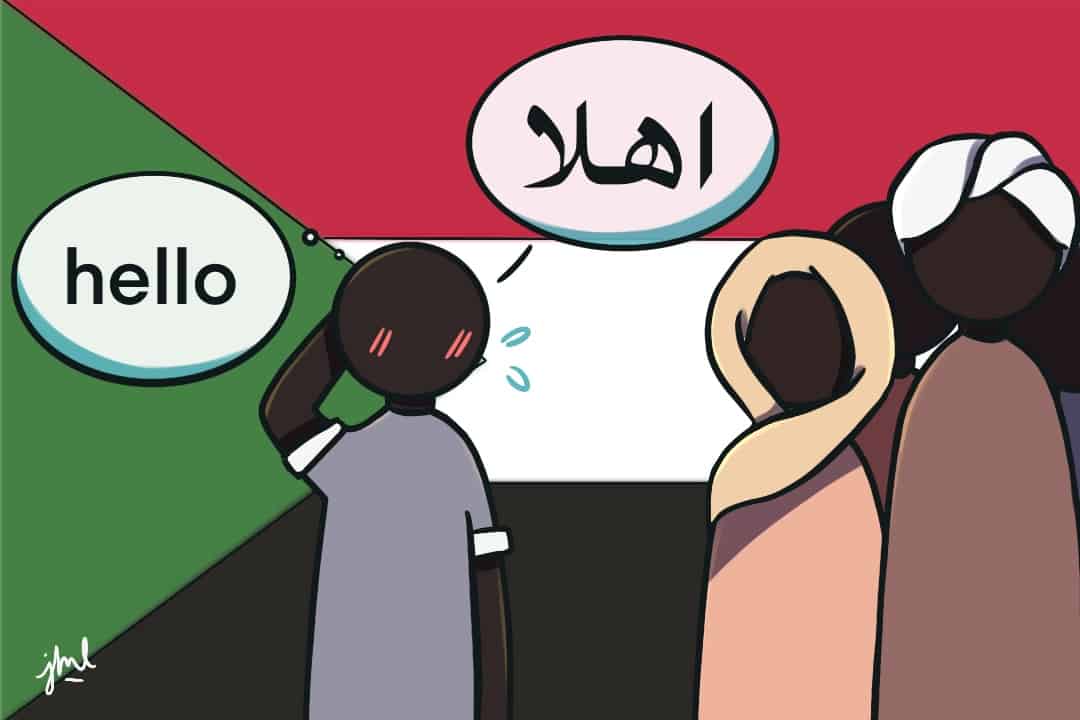I was in the car after I had just landed from a 12-hour flight from Toronto, with the grimy air clinging to me like saran wrap. There had been an issue at baggage claim and I had waited three hours for my bags to appear. But I was finally back in Sudan, my home — the sun was shining, the AC in the car was blasting, and I was with my mother and sister. It was only when I started telling my mother about my flight — that is, complaining about the fact that I had been seated right by the bathrooms — that my sister piped up from the backseat:
“Your Arabic sounds so weird now!”
Over the next few days, the comment would be voiced by various members of my immediate and extended family. A lot of the instances were comical, others not so much. It took me a couple of days to realize the problem. I was thinking in English. So, many of the errors I was making were a result of me literally translating from English to Arabic, which produced awkward and stunted sentences. The realization brought forth a crisis.
I learned English growing up. My parents rightfully concluded that being fluent would give me better opportunities in an increasingly globalized world. Learning English was never a challenge, since I started doing so when I was four, and I was also exposed to the language through western media. I learned Arabic simultaneously and always prided myself in the fact that I was fluent in both.
But Arabic remained special in my heart of hearts. It was the language in which I thought and the one I used to communicate with my family and other Sudanese people. Due to my journalist father, I grew up surrounded by journalists, writers, and poets, all of whom have shaped my taste in books to this day. And they all wrote in Arabic.
All of this changed when I moved to Toronto in 2019. Suddenly, English was everywhere, not only in an academic setting — something that I was used to — but also in the most mundane of errands. And slowly, without me even realizing it, my grasp on Arabic began to fade.
First language attrition, though understudied, is a term that linguists use to denote a loss of fluency in a previously acquired language that is not a result of physical injury. It is common in immigrants, especially those who immigrate at a young age without having mastered large aspects of their first language. My mistake was thinking, hoping, that 19 years in my home country would somehow exempt me from this.
This might seem like an overreaction on my part — surely my language attrition was reversible. Surely I was exaggerating, and spending the summer back home would bring back my proficiency in Arabic. Otherwise, I would have to admit that the loss of thinking in my mother tongue felt huge. Like the ultimate form of assimilation.
And indeed, living so far away from where I had spent the vast majority of my life made me feel like I was disconnected from a vast consciousness to which everyone that I loved seemed to still have an attachment. Even though the thread of proximity was severed, the loss of Arabic felt much more substantial.
The loss was so strong in part because of my understanding of linguistic determinism. The theory proposes that the language one speaks can dictate their thoughts and even what concepts they can grasp. In retrospect, the suggestion that you can determine how a person thinks is, to say the least, problematic. But to my uneducated mind, the theory only cemented the irrational fear that I was losing something innate, that somehow the past version of myself that was fluent in Arabic was literally able to connect with my culture and understand things that the current me could not.
The connection that I was losing was not just cultural but also political. In 2019, a few weeks before I moved to Toronto, the Sudanese people ousted a 30-year dictatorship after much strife and bloodshed — it felt like a new dawn was rising in Sudan. Everything from the news and interviews, to the rhythmic chants at protests, and to the Whatsapp groups’ half-baked analyses was in Arabic. Losing my fluency in Arabic didn’t just feel like losing the past but also the future.
It only takes some research, however, to find out that most linguists do not believe in such an extreme form of the theory of linguistic determinism.
I began to realize that I was trying to solve a communal problem in an individualistic way. The solution to my feeling of disconnect wasn’t something that I could only work on internally, and such a narrow approach was something that would have confused my family. If I wanted to feel connected to my community, to my past, and cultural future, I simply had to reach out to those in my community — to those who had an idea of what I was going through.
I was approaching a problem concerning my sense of disconnect with a method that did not prioritize reconnecting. Obsessing over retaining my fluency so I could maintain cultural connectedness while not seeking new community ties was akin to spell checking a text that I was never actually going to send. Being Sudanese was not just about speaking Arabic — since many Sudanese people do not actually speak Arabic as a first language — but I still staked so much of my heritage on it. I thought that if I could relearn the language then maybe I could relearn the culture — it was perhaps to feel like I could control the alienation I was experiencing.
But in reality, I was only further distancing myself from a culture and community that would find my solution reductive. It was the height of irony.


